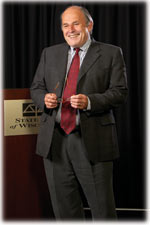 Wisconsin Lawyer
Wisconsin Lawyer
Vol. 79, No. 2, February
2006
Treat Clients Respectfully
The key to avoiding malpractice claims
is not superior skill but is listening to your clients and treating them
with respect. People don't sue lawyers they like and who take the extra
time to listen and respond.
by D. Michael Guerin
"They may not remember what you said, but they will always
remember how you treated them." - Unknown
As you may have sensed from my past columns, I love to read books by
authors who make me think about what is really happening in society. A
recent favorite is Blink: The Power of Thinking Without
Thinking by Malcolm Gladwell, a reporter for The New
Yorker.
The premise of Gladwell's book is the concept of "thin-slicing" - the
ability of our unconscious minds to see patterns in situations and
behavior based on very narrow slices of experience. I was struck by
Gladwell's reference to a study of medical malpractice cases. The study
concluded that highly skilled and specialized physicians are sued much
more often than their lesser-skilled and specialized colleagues. Why?
People tend not to sue doctors they like - and they like doctors who
take a few extra minutes to really listen to their patients.
In April 2005, the American Bar Association issued a publication
profiling legal malpractice claims for the period 2000-2003. Although
the profile is filled with data regarding the most common alleged
errors, the number of claims by area of practice, and financial issues,
it does not - and probably cannot - explain why some lawyers get sued
and others do not get sued for the same errors. I firmly believe the
reason lies in the same principles discussed in Blink: people
don't sue lawyers who they like and who take the extra time to listen
and respond.
Bar leaders are often called on to address and enhance the image of
lawyers and the perception of lawyers by the public. Although the Bar's
branding effort is an excellent model to educate the public about the
value lawyers bring to their communities, it will not and cannot succeed
unless we as lawyers do whatever we can do to enhance our own image with
our own clients.
How? Give your clients an extra minute on the phone. Respond to voice
mail and email messages as soon as possible. Be on time for court
appearances and appointments. Explain procedures, processes, and what
documents "really" mean. If you do so, your clients are less likely to
believe that you - rather than bad facts or bad law - are at fault if
their claims or defenses are unsuccessful.
That said, there is no avoiding the fact that no matter how much your
clients like you, there is always a real possibility of becoming
involved in a malpractice claim. I am very concerned by the number of
lawyers who do not have legal malpractice insurance, putting not only
their practices but also their families' financial stability at risk.
Based on discussions I have had with my counterparts and the executive
staff of other states' bar associations, this situation is not unique to
Wisconsin. I urge all of you who are practicing without insurance to
contact the Wisconsin Lawyers Mutual Insurance Company (WILMIC). Formed
with the assistance of the State Bar, WILMIC specializes in professional
liability insurance for Wisconsin lawyers. You can reach a WILMIC
representative at (800) 373-3839 or (608) 288-1866.
Finally, don't forget to make plans now to attend the State Bar 2006
Annual Convention at the Monona Terrace Convention Center in Madison
from May 3-5, 2006. The convention provides a wonderful opportunity to
meet with other lawyers, to share ideas and concerns, to contact your
Board of Governors representatives and other State Bar leaders and
officers, and to obtain CLE credits. This year's keynote speaker, Nina
Totenburg, legal reporter for National Public Radio, is a dynamic and
engaging speaker and her talk is sure to be one of the highlights of
this year's event. Visit www.wisbar.org for more information or
to register for the State Bar 2006 Annual Convention.
Wisconsin Lawyer
